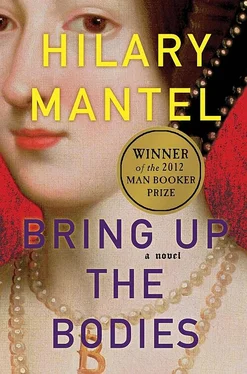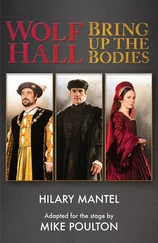Gregory nods. He seems to understand, but perhaps seeming is as far as it goes. When Gregory says, ‘Are they guilty?’ he means, ‘Did they do it?’ But when he says, ‘Are they guilty?’ he means, ‘Did the court find them so?’ The lawyer’s world is entire unto itself, the human pared away. It was a triumph, in a small way, to unknot the entanglement of thighs and tongues, to take that mass of heaving flesh and smooth it on to white paper: as the body, after the climax, lies back on white linen. He has seen beautiful indictments, not a word wasted. This was not one: the phrases jostled and frotted, nudged and spilled, ugly in content and ugly in form. The design against Anne is unhallowed in its gestation, untimely in its delivery, a mass of tissue born shapeless; it waited to be licked into shape as a bear cub is licked by its mother. You nourished it, but you did not know what you fed: who would have thought of Mark confessing, or of Anne acting in every respect like an oppressed and guilty woman with a weight of sin upon her? It is as the men said today in court: we are guilty of all sorts of charges, we have all sinned, we all are riddled and rotten with offences and, even by the light of church and gospel, we may not know what they are. Word has come from the Vatican, where they are specialists in sin, that any offers of friendship, any gesture of reconciliation from King Henry, would be viewed kindly at this difficult time; because, whoever else is surprised, they are not surprised in Rome about the turn events have taken. In Rome, of course, it would be unremarkable: adultery, incest, one merely shrugs. When he was at the Vatican, in Cardinal Bainbridge’s day, he quickly saw that no one in the papal court grasped what was happening, ever; and least of all the Pope. Intrigue feeds on itself; conspiracies have neither mother nor father, and yet they thrive: the only thing to know is that no one knows anything.
Though in Rome, he thinks, there is little pretence at process of law. In the prisons, when an offender is forgotten and starves, or when he is beaten to death by his gaolers, they just stuff the body into a sack then roll and kick it into the river, where it joins the Tiber’s general effluent.
He looks up. Gregory has been sitting quietly, respectful of his thoughts. But now he says, ‘When will they die?’
‘It cannot be tomorrow, they need time to settle their business. And the queen will be tried in the Tower on Monday, so it must be after that, Kingston cannot…the court will sit in public, you see, the Tower will be awash with people…’ He pictures an unseemly scramble, the condemned men having to fight to the scaffold through the incoming hordes who want to see a queen on trial.
‘But will you be there to watch?’ Gregory insists. ‘When it does occur? I could attend them at the last to offer them my prayers, but I could not do it unless you were there. I might fall down on the ground.’
He nods. It is good to be realistic in these matters. He has heard street brawlers in his youth boast of their stomach, then blench at a cut finger, and anyway being at an execution is not like being in a fight: there is fear, and fear is contagious, whereas in a scrap there is no time for fear, and not until it’s over do your legs begin to shake. ‘If I am not there, Richard will be. It is a kindly thought and though it would give you pain I feel it shows respect.’ He cannot guess the shape of the next week. ‘It depends…the annulment must go through, so it rests with the queen, on how she helps us, will she give her assent.’ He is thinking aloud: ‘It may be I am at Lambeth with Cranmer. And please, my dear son, don’t ask me why there has to be an annulment. Just know it’s what the king wants.’
He finds he cannot think of the dying men at all. Into his mind instead strays the picture of More on the scaffold, seen through the veil of rain: his body, already dead, folding back neatly from the impact of the axe. The cardinal when he fell had no persecutor more relentless than Thomas More. Yet, he thinks, I did not hate him. I exercised my skills to the utmost to persuade him to reconcile with the king. And I thought I would win him, I really thought I would, for he was tenacious of the world, tenacious of his person, and had a good deal to live for. In the end he was his own murderer. He wrote and wrote and he talked and talked, then suddenly at a stroke he cancelled himself. If ever a man came close to beheading himself, Thomas More was that man.
The queen wears scarlet and black, and instead of a hood a jaunty cap, with feathers of black and white sweeping across its brim. Remember those plumes, he tells himself; this will be the last time, or almost so. How did she look, the women will ask. He will be able to say she looked pale, but unafraid. How can it be for her, to enter that great chamber and to stand before the peers of England, all men and none of them desiring her? She is tainted now, she is dead meat, and instead of coveting her – bosom, hair, eyes – their gaze slides away. Only Uncle Norfolk glares at her fiercely: as if her head were not Medusa’s head.
In the centre of the great hall at the Tower they have built a platform with benches for the judges and peers, and there are some benches too in the side arcades, but the most part of the spectators will be standing, pushing in behind each other till the guards say ‘No more,’ and block the doorways with staves. Even then they push, and the noise rises as those who have been let through jostle in the well of the court, till Norfolk, his white baton of office in his hand, calls for silence, and from the ferocious expression on his face, the most ignorant person in that throng knows he means it.
Here is the Lord Chancellor seated by the duke, to supply him with the best legal advice in the kingdom. Here is the Earl of Worcester, whose wife, you might say, started all this; and the earl gives him a filthy look, he does not know why. Here is Charles Brandon, Duke of Suffolk, who has hated Anne since he set eyes on her and has made it plain to the king’s face. Here is the Earl of Arundel, the Earl of Oxford, the Earl of Rutland, the Earl of Westmorland: among them he moves softly, plain Thomas Cromwell, a greeting here and a word there, spreading reassurance: the Crown’s case is in order, no upsets are expected or will be tolerated, we shall all be home for supper and sleep safely in our own beds tonight. Lord Sandys, Lord Audley, Lord Clinton and many lords more, each pricked off on a list as they take their seats: Lord Morley, George Boleyn’s father-in-law, who reaches for his hand and says, please, Thomas Cromwell, as you love me, let not this sordid business rebound on my poor little daughter Jane.
She was not so much your poor little daughter, he thinks, when you married her off without asking her; but it is common, you cannot blame him as a father, for as the king once said to him ruefully, it is only very poor men and women who are free to choose who they love. He clasps Lord Morley’s hand in return, and wishes him courage, and bids him take his seat, for the prisoner is among us and the court prepared.
He bows to the foreign ambassadors; but where is Chapuys? Word is passed forward, he is suffering from a quartan fever: word is passed back, I am sorry to hear that, let him send to my house for anything that might make him more comfortable. Say his fever is up today, day one: its tide ebbing tomorrow, by Wednesday he is on his feet but shaky, but by Thursday night he will be down again, as it shakes him in its grip.
The Attorney General reads the indictment, and it takes some time: crimes under statute, crimes under God. As he gets to his feet to prosecute he is thinking, the king expects a verdict by mid-afternoon; and glancing across the court he sees Francis Bryan, still in his outdoor coat, ready to get on the river with word to the Seymours. Steady, Francis, he thinks, this may take some time, it may get hot in here.
Читать дальше
Конец ознакомительного отрывка
Купить книгу












